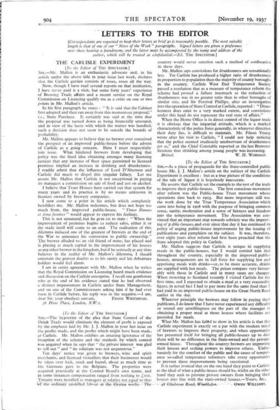[To the Editor of THE SPECTATOR.] Sm,—The hypocrisy of the
plea that State Control of the Drink Trade would eliminate the element of profit is exposed by the emphasis laid by Mr. J. J. Mallon in your last issue on the profits made, and the profits which might have been made, at Carlisle. Mr. Mallon exhibits an amazing ignorance of the inception of the scheme and the methods by which control was acquired when he says that " the private interest was glad to sell out " and " its solatium was not ungenerous."
Ten days' notice was given to brewers, wine and spirit merchants, and licensed victuallers that their businesses would be taken over lock, stock and barrel, about as much time as the, Germans gave to the Belgians. The properties were acquired practically at the Control 'Board's own terms, and in some instances compensation ranged from nothing to Lioo. Tenants were installed as managers at salaries not equal to that
country would never sanction such a method of confiscation in these days.
Mr. Mallon says convictions for drunkenness are sensationally less. Yet Carlisle has produced a higher ratio of drunkenness in proportion to population than the majority of county boroughs in the country. Carlisle West End Temperance Society passed a resolution that as a measure of temperance reform the scheme had proved a failure inasmuch as the reduction of drunkenness was in no greater ratio than in other boroughs of similar size, and Sir Percival Phillips, after an investigation into the operation of State Control at Carlisle, reported : cDrun. kenness does exist to a very marked extent, and convictions under this head do not represent the real state of affairs."
When the Home Office is in direct control of the liquor trade it is obvious that the impartial attitude, which is a marked characteristic of the police force generally, in whatever direction their duty lies, is difficult to maintain. Mr. Filson Young wrote after his visit to Carlisle, " I could not help noticing that the police seemed studiously unobservant of drunkenness per se," and the Chief Constable reported at the last Brewster Sessions that drinking among young people was increasing.
















































































































 Previous page
Previous page